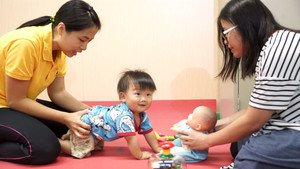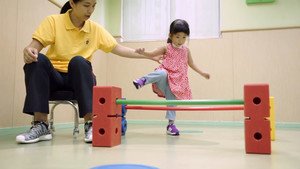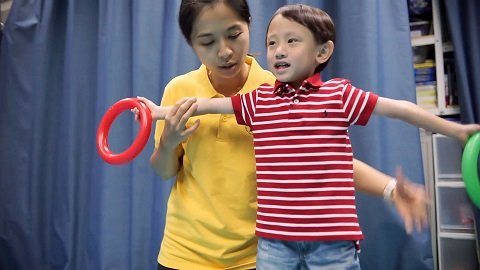Heep Hong Society
I-Move-to-Learn

Case of one-year-old child: Chung Ki is doing a 'row a boat' training.

Case of three-year-old child: Lok Ching has difficulty in keeping balance.

Case of five-year-old child: Wang Sum is doing a "Making X" exercise.
Preterm infants generally take longer to grow and adapt to the environment than full-term infants. Parents should consult a physiotherapist and conduct a detailed assessment as soon as possible if they find their baby having the following problems at certain corrected ages:
- Failure to keep his head at midline when sitting on the ground by the age of 6 months
- Failure to lift his tummy off the ground or having a strange posture when crawling by the age of 9 months
- Failure to stand by the age of 1
- Failure to walk by the age of 1.5
- Failure to walk steadily, climb up and down a chair, walk up and down stairs, do simple movements such as throwing and kicking balls, and imitate doing housework
- Failing to hop on both feet by the age of 2.5
According to the clinical experience of physiotherapists team in Heep Hong Society, most preterm infants are at high risk of developmental problems in different intensity. Early identification and specific training can facilitate the overall development of preterm infants. Physiotherapists can conduct a standardised assessment on the physical development of premature babies to analyse their difficulties in development and learning. Training goals and suitable activities will be designed according to the needs of each preterm infant so as to help them achieve developmental targets through diversified training activities. Suggestions will also be made to parents and caregivers in conducting training activities at home.
Research shows that preterm babies generally have a higher chance of developing learning difficulties and disorders than full-term infants before starting primary school. The smaller gestational age is (under 32 weeks) and the lower the birth weight is (less than 2 kg), the higher the incidence of learning difficulties and disorders is. Early training can effectively reduce the influence of these difficulties and disorders on the future learning of preterm babies. (Johnson, 2017; Jaekel & Wolke, 2014)
Physiotherapists team of Heep Hong Society has developed the I-Move-to-Learn treatment for preterm children with learning difficulties, which features of multiple movements training to enhance neurological networking, physical development and learning abilities among preterm children.
Activities will be different according to children's ability. If you have any questions, please consult your physiotherapist.
